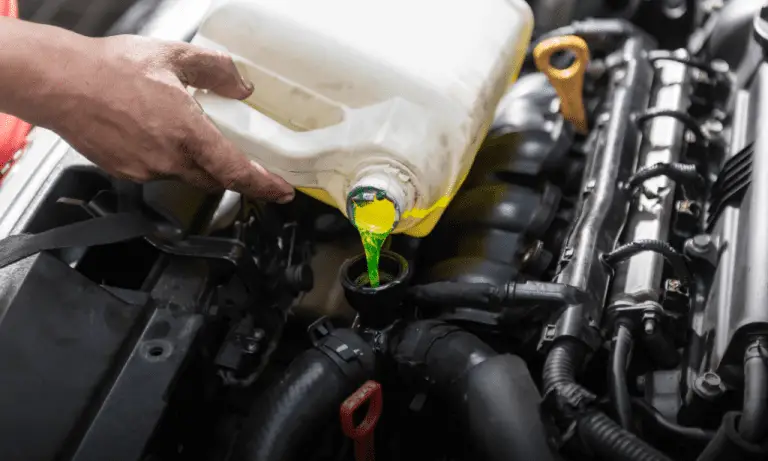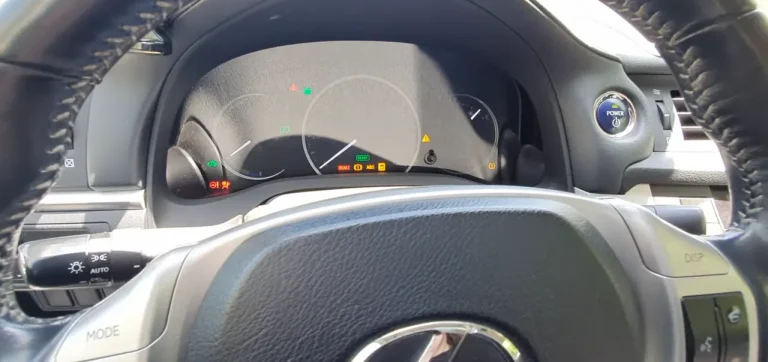Discover the 5 Telltale Signs Your Car AC Is Low on Freon
The 5 signs your car ac is low on freon include weak airflow, warm air blowing, clicking noise, leaking water, and ice buildup on the evaporator coils. Are you noticing that your car’s air conditioning system is not performing at its best?
If so, it could be a sign that your car ac is low on freon. Freon, also known as refrigerant, is responsible for cooling the air that is circulated inside your vehicle. When the freon levels are low, several indicators can help you identify the issue.
We will explore the five signs that your car ac is low on freon, including weak airflow, warm air blowing, clicking noise, leaking water, and ice buildup on the evaporator coils. By recognizing these signs early on, you can address the problem and ensure your car’s ac system is functioning optimally.
What Is Freon And Why Is It Important?
Definition Of Freon
Freon is a common name for a group of chemical compounds known as chlorofluorocarbons (cfcs) or hydrochlorofluorocarbons (hcfcs). These compounds are used in air conditioning systems, including car ac units, to provide cooling. Freon absorbs heat from the air inside the car and then releases it outside, resulting in a cool and comfortable interior.
It essentially acts as a refrigerant in the ac system.
How Freon Helps In Cooling The Car
Freon plays a crucial role in the cooling process of your car’s ac system. Here’s how it works:
- The ac compressor pressurizes and circulates the freon throughout the system.
- The high-pressure freon flows through the evaporator coil, which is located inside the car. As the warm air from the inside passes over the coil, the freon absorbs the heat from the air.
- The cooled air is then blown into the cabin, creating a comfortable temperature.
- The heated freon then flows to the condenser coil located outside the car.
- The condenser coil releases the heat absorbed from the air inside the car into the outside environment, cooling the freon back down.
- The cooled freon is then recirculated through the system to repeat the process.
Why Low Freon Levels Can Be A Problem
Low levels of freon in your car’s ac system can lead to several issues:
- Reduced cooling efficiency: When the freon levels are low, the ac system struggles to generate cool air, resulting in poor cooling performance. You may notice that the air blowing out of the vents is less cold than usual.
- Increased energy consumption: As the ac system works harder to compensate for low freon levels, it consumes more energy. This can lead to higher fuel consumption and increased strain on the car’s engine.
- Ac system damage: Freon not only provides cooling but also acts as a lubricant for the ac compressor. When the freon levels are low, the compressor may not receive adequate lubrication, leading to premature wear and potential damage to the system.
- Potential component failure: Low freon levels can cause the ac system components to overheat. Over time, this can result in critical component failures, such as a failed compressor, which can be costly to repair or replace.
- Environmental impact: Freon is known to contribute to ozone layer depletion and has been phased out in many countries due to its harmful effects on the environment. It is important to keep the freon levels in your car’s ac system optimized to minimize any potential environmental impact.
Regular maintenance and periodic checks of your car’s ac system can help ensure proper freon levels, improving cooling efficiency and prolonging the lifespan of the system. If you suspect that your car’s ac is low on freon, it is advisable to consult a professional technician for a thorough inspection and recharge if necessary.
Sign 1: Weak Airflow
Is the airflow in your car not as strong as it used to be? This could be a sign that your car’s ac is low on freon. Weak airflow can make driving uncomfortable, especially during hot summer months. It is important to identify the cause of weak airflow and take appropriate action to restore the cooling performance of your ac system.
How To Determine Weak Airflow
Here are a few ways to determine if your car’s ac is experiencing weak airflow:
- Place your hand in front of the vents while the ac is running. If you feel minimal or no air coming out, it could indicate weak airflow.
- Compare the airflow to what you remember from when the ac was working effectively. Any noticeable decrease can be a sign of weak airflow.
- If it takes longer than usual for your car to cool down, it could be due to reduced airflow caused by low freon levels.
Possible Causes Of Weak Airflow
Weak airflow can be caused by various factors, including:
- A clogged cabin air filter: Over time, the cabin air filter can become dirty and clogged, restricting the airflow from the ac system.
- Blockage in the air vents: Debris, such as leaves or dust, can accumulate and block the air vents, reducing airflow.
- Damaged or failing blower motor: The blower motor is responsible for pushing air through the ac system. If it is damaged or malfunctioning, it can result in weak airflow.
- Leaking refrigerant: Low freon levels due to refrigerant leaks can lead to reduced cooling performance and weak airflow.
Relationship Between Freon Levels And Airflow
Freon, also known as refrigerant, plays a crucial role in the cooling process of your car’s ac system. It absorbs heat from the air, allowing the air to be cooled before being circulated back into the car’s interior. When freon levels are low, it directly affects the cooling efficiency and airflow of the ac system.
Low freon levels can cause the evaporator coil, which cools the air, to freeze up. This ice buildup can restrict the airflow, resulting in weak airflow from the vents. Additionally, low freon levels can put strain on the compressor, causing it to work harder and potentially leading to its failure.
If you notice weak airflow from your car’s ac system, it is important to have it checked by a qualified technician. They can diagnose the problem, determine if it is related to low freon levels, and recharge the system if necessary.
Restoring proper freon levels will not only improve airflow but also ensure optimal cooling performance for a comfortable driving experience.
Sign 2: Insufficient Cooling
Are you starting to feel like your car’s air conditioning system just isn’t cutting it anymore? It could be a sign that your car’s ac is low on freon. Insufficient cooling is one of the key indicators that there may be an issue with your ac’s freon levels.
Let’s delve into this a bit further to help you understand what to look out for.
Recognizing Insufficient Cooling In The Car
When your car’s ac is low on freon, you may notice a decline in its cooling performance. The air blowing out of the vents may feel lukewarm or not as cold as you’ve become accustomed to. Pay close attention to the following signs of insufficient cooling in your vehicle:
- The ac takes longer than usual to cool down the interior of your car.
- There is a noticeable temperature difference between the driver and passenger sides of the vehicle.
- The air conditioning system is struggling to reach the set temperature, even when adjusted to the maximum cooling setting.
- The airflow from the vents is weak and does not provide adequate cooling.
- You may hear unusual noises, such as hissing or gurgling sounds coming from the ac system.
How Low Freon Levels Affect Cooling Performance
Freon, also known as refrigerant, is responsible for absorbing heat from the air in your car’s ac system. When the freon levels are low, it can impact the cooling performance in several ways:
- Reduced heat absorption: Freon is the key component that helps remove heat from the air. When levels are low, it becomes less effective in removing heat, resulting in insufficient cooling.
- Inefficient heat transfer: Low freon levels can hinder the efficient transfer of heat in the ac system. This can lead to the air not being cooled efficiently and, in turn, not providing the desired temperature inside your vehicle.
- Strained compressor: When the freon levels are low, the compressor has to work harder to generate the desired cooling effect. This can put stress on the ac system and potentially lead to premature wear and tear on the compressor.
Potential Issues That Can Arise From Insufficient Cooling
Insufficient cooling in your car can lead to several frustrating issues:
- Discomfort: A lack of cool air can make driving in hot weather unbearable. It can cause discomfort and increase the temperature inside the vehicle.
- Foggy windows: Without proper cooling, the ac system may struggle to dehumidify the air inside the car. This can result in foggy windows, reducing visibility and posing a safety risk.
- Odors: Inadequate cooling can lead to moisture buildup in the ac system, creating a breeding ground for bacteria and mold. This can cause unpleasant odors to permeate throughout your car’s interior.
- Increased wear and tear: When the ac system is working harder due to low freon levels, it can cause additional strain on the components. This can result in increased wear and tear, potentially leading to costly repairs in the long run.
It’s important to keep an eye out for signs of insufficient cooling in your car’s ac system. If you notice any of these indicators, it’s advisable to have your freon levels checked and replenished if necessary. Regular maintenance and prompt attention to cooling issues can help ensure that your car’s ac system keeps you cool and comfortable, no matter the weather outside.
Sign 3: Strange Noises
Common Ac Noises:
When it comes to your car’s ac system, strange noises can often be a sign that something is amiss. If you notice unusual sounds coming from your vehicle’s ventilation system, it’s important to address them promptly to avoid further damage.
Here are some common ac noises you might encounter:
- Buzzing or humming: This noise could indicate a problem with the compressor or fan motor. It may be caused by loose or damaged parts, which can lead to reduced ac performance.
- Squealing or screeching: These high-pitched noises often suggest a worn-out ac belt. Over time, the belt can become loose or damaged, leading to friction and unpleasant sounds.
- Rattling or clunking: If you hear these noises, it could be due to loose or broken components within the ac system. Loose fan blades, debris in the vents, or a malfunctioning compressor can all contribute to such sounds.
- Clicking or tapping: These repetitive sounds might be a result of a faulty relay switch, indicating an electrical issue within the ac system. Ignoring this noise could lead to further damage or even a complete ac system failure.
- Hissing or bubbling: This noise could potentially be the sound of refrigerant leaking from the ac system. Low freon levels can cause the ac compressor to work harder, making it more susceptible to damage and leakage.
How Low Freon Levels Contribute To Strange Noises:
Low freon levels can play a significant role in the occurrence of strange noises within your car’s ac system. As the freon level drops, the ac compressor has to work harder to meet the cooling demands. This increased workload can lead to various issues that produce the unusual noises mentioned earlier, such as:
- Strain on the compressor: Low freon levels force the compressor to run continuously, causing extra strain on its components. This strain can result in unusual sounds like buzzing, rattling, or clicking.
- Inadequate lubrication: Freon not only cools the air but also acts as a lubricant for the ac compressor. When freon levels are low, there may not be enough lubrication to prevent grinding, squealing, or screeching noises.
- Increased pressure fluctuations: Insufficient freon can cause pressure fluctuations within the ac system, leading to hissing or bubbling sounds as air and refrigerant escape through leaks.
The Importance Of Addressing Strange Noises Promptly:
Addressing strange noises coming from your car’s ac system is crucial for several reasons:
- Early detection: Paying attention to strange noises allows you to catch potential issues before they escalate. Prompt action can prevent further damage to the ac system and save you from costly repairs.
- Enhanced safety: Ignoring strange ac noises can lead to a malfunctioning system, putting your safety at risk. For example, a failing compressor may stop working altogether, resulting in no cool air during hot weather.
- Improved performance: By addressing strange ac noises promptly, you can ensure that your car’s ac system operates optimally. Fixing any underlying issues will help restore the ac system’s efficiency, providing you with reliable cooling and comfort.
Remember, strange noises should never be ignored. If you notice any unusual sounds coming from your car’s ac system, it’s best to consult a professional mechanic to diagnose and address the problem promptly.
Sign 4: Ac Compressor Cycles Frequently
Is your car’s ac compressor turning on and off more frequently than usual? This could be a sign that your car’s ac is low on freon. Understanding this connection between low freon levels and frequent compressor cycling is essential for diagnosing and resolving the issue.
Let’s dive into the details.
What Is Ac Compressor Cycling?
Ac compressor cycling refers to the process in which the ac compressor turns on and off to maintain the desired temperature inside the car. This cycling is regulated by the ac system’s pressure sensors and controls. When the refrigerant level is low, the ac compressor needs to work harder to maintain the cooling effect, resulting in more frequent cycling.
Here are the key points to understand about ac compressor cycling:
- Frequent on and off cycles of the ac compressor can be an indication of low freon levels in the ac system.
- The ac compressor cycling is controlled by pressure sensors that monitor the refrigerant levels in the system.
- When the refrigerant level drops, the pressure in the system decreases, triggering the ac compressor to cycle more frequently.
- Ac compressor cycling is a mechanism to prevent damage to the compressor due to inadequate refrigerant levels.
Relationship Between Low Freon Levels And Frequent Compressor Cycling
Low freon levels play a significant role in the frequency of ac compressor cycling. Here’s how they are related:
- When the ac system is low on freon, the pressure in the system decreases.
- The pressure drop triggers the pressure sensors to signal the ac compressor to turn on more often to compensate for the lack of refrigerant.
- Frequent compressor cycling becomes necessary to attempt to cool the air as best as possible despite the low freon levels.
- This cycle continues until the refrigerant levels are replenished or the issue is resolved.
Potential Consequences Of Frequent Compressor Cycling
Frequent compressor cycling due to low freon levels can have several consequences:
- Reduced cooling efficiency: The ac system may struggle to provide adequate cooling, resulting in less effective temperature control inside the car.
- Increased wear and tear: The frequent on and off cycling can put additional strain on the ac compressor, leading to increased wear and potential damage to the system.
- Poor fuel efficiency: A struggling ac system may require more energy to operate, resulting in decreased fuel efficiency.
- Lengthened recovery time: With low refrigerant levels, the ac system may take longer to reach the desired temperature, causing discomfort for the occupants.
Addressing the low freon levels promptly is crucial to prevent further damage and restore optimal performance to your car’s ac system.
Now that we understand the connection between low freon levels and frequent compressor cycling, let’s explore the next sign to watch out for in our upcoming section.
Sign 5: Leaking Refrigerant
Recognizing Signs Of Refrigerant Leakage
- If you notice that your car’s air conditioning is not cooling as well as it used to, it could be a sign of refrigerant leakage.
- Another indication is if you hear a hissing sound coming from the air conditioning system when it is turned on.
- A constant need to recharge the system with refrigerant is also a strong indication of a refrigerant leak.
- In some cases, you may even notice a sweet, pungent smell coming from the vents when the air conditioning is running, which can be a result of refrigerant leakage.
- The presence of oily residue or stains around the air conditioning components is also a clear sign of refrigerant leakage.
How Low Freon Levels Result From Refrigerant Leaks
- Refrigerant leaks cause the levels of freon, the cooling agent in your car’s air conditioning system, to drop.
- Freon is responsible for absorbing heat from the air inside your car and releasing it outside, which allows the air conditioning system to produce cool air.
- When there is a refrigerant leak, the freon escapes and reduces the amount available to absorb heat, resulting in decreased cooling efficiency.
- As the freon levels continue to drop, the air conditioner may stop blowing cold air altogether, leaving you uncomfortable in hot weather.
Importance Of Fixing Refrigerant Leaks
- Fixing refrigerant leaks is crucial for maintaining the effectiveness and longevity of your car’s air conditioning system.
- A refrigerant leak not only diminishes the cooling performance but also places additional strain on the system as it tries to compensate for the decreased refrigerant levels.
- Continuously running the air conditioning with low freon levels can cause the compressor to overheat and potentially lead to expensive repairs or even system failure.
- It is also important to note that refrigerant leaks contribute to environmental pollution as the leaked gas depletes the ozone layer.
- By promptly addressing refrigerant leaks, you not only ensure the optimal functioning of your car’s air conditioning but also play your part in preserving the environment.
Remember, if you suspect a refrigerant leak in your car’s air conditioning system, it is crucial to have it inspected and repaired by a qualified professional. Don’t delay fixing refrigerant leaks to avoid further damage and costly repairs.
Conclusion
Understanding the signs of low refrigerant (freon) in your car’s ac system is essential for maintaining its optimal performance. By paying attention to these indicators, such as warm air blowing from the vents, reduced cooling capacity, unusual noises, leakage, and compressor not engaging, you can identify potential freon level issues early on.
Taking prompt action and seeking professional assistance can prevent further damage to your ac system and save you from costly repairs in the long run. Regular maintenance, including checking and replenishing refrigerant levels as needed, will help ensure a comfortable and hassle-free driving experience during the hot summer months.
Don’t ignore these signs and address any ac-related issues promptly to keep your car’s ac system in top shape.
- Why Are My Car Headlights Not Bright Enough? - May 9, 2024
- How Long Can You Drive With An EVAP Leak? - May 9, 2024
- What Does B Stand for in a Car? [Full Guide] - May 9, 2024




